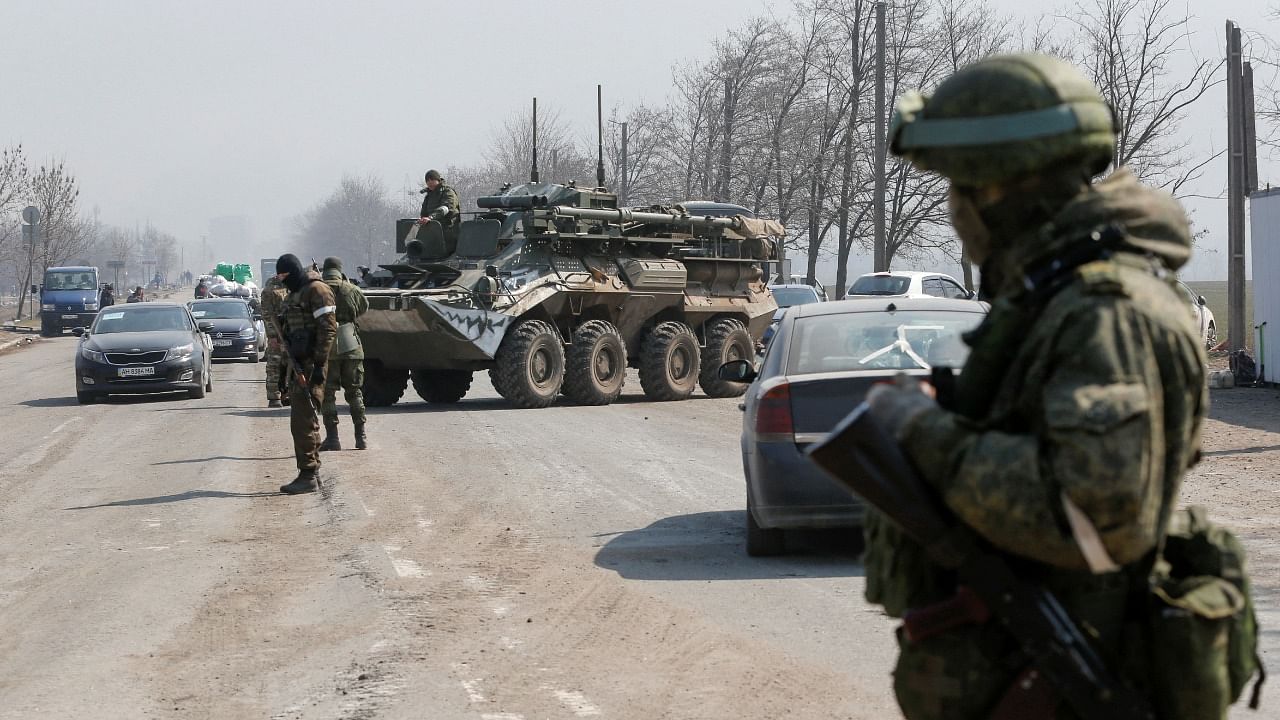
The government of the Ukrainian city of Mariupol says 300 people died in a Russian airstrike on March 16 on a theatre being used as a bomb shelter.
The post Friday on the city government Telegram channel cited eyewitnesses for the toll of “about 300.”
It was not immediately clear whether emergency workers had finished excavating the site or how the eyewitnesses arrived at the horrific death toll.
When the theater was struck, an enormous inscription reading “CHILDREN” was posted outside in Russian, intended to be visible from the skies above.
Soon after the airstrike, Ludmyla Denisova, the Ukrainian Parliament's human rights commissioner, said more than 1,300 people had been sheltering in the building.
As Russia relentlessly besieges and pummels Ukraine's cities, nearly anyone who can is trying to leave and those left behind face desperate food shortages in a country once known as the breadbasket for the world.
In the shelled city of Kharkiv, mostly elderly women came to collect food and other urgent supplies.
In the capital of Kyiv, ashes of the dead are piling up at the main crematorium because so many relatives have left, leaving urns unclaimed.
For civilians unable to join the flood of refugees from Ukraine, the days of plenty in the country are becoming just a fading memory, as the war grinds into a second month.
With Ukrainian soldiers battling Russia's invasion force to a near stalemate in many places and the president urging people to remain steadfast, the US and the European Union announced a move to further squeeze Russia: a new partnership to reduce Europe's reliance on Russian energy and slowly squeeze off the billions of dollars the Kremlin gets from sales of fossil fuels.
In Ukraine, the war for hungry civilians is increasingly being counted in precious portions of food, and block of cheese now goes a very long way.
Fidgeting with anticipation, a young girl in Kharkiv watched intently this week as a volunteer's knife cut through a giant slab of cheese, carving out thick slices — one for each hungry person waiting stoically in line.
Hanna Spitsyna took charge of divvying up the delivery of food aid from the Ukrainian Red Cross, handing it out to her neighbours. Each got a lump of the cheese that was cut under the child's watchful gaze, dropped chunk by chunk into plastic bags that people in line held open like hungry mouths.
“They brought us aid, brought us aid for the elderly women that stayed here," Spitsyna said. “All these people need diapers, swaddle blankets and food."
Unable to sweep with lightning-quick speed into Kyiv, their apparent aim on Feb. 24 when the Kremlin launched the war, Russian forces are instead raining down shells and missiles on cities from afar.
The outskirts of Kharkiv were shrouded by foggy smoke Friday, with shelling constant since early in the morning.
In a city hospital, several wounded soldiers arrived, with bullet and shrapnel wounds, a day after doctors treated a dozen civilians. Even as doctors stabilised the direst case, the sound of shelling could be heard in the surgery ward.
Russia's military claimed Friday that it destroyed a massive Ukrainian fuel base used to supply the Kyiv region's defenses, with ships firing a salvo of cruise missiles, according to the Interfax news agency. Videos on social media showed an enormous fireball explosion near the capital.
For civilians, the misery has become unrelenting. Kyiv, like other cities, has seen its population dramatically reduced in the vast refugee crisis that has seen more than 10 million displaced and at least 3.5 million fleeing the country entirely.
In the capital, over 260 civilians have died and more than 80 buildings been destroyed since the start of the war.
Ukrainian President Volodymyr Zelenskyy urged his country to keep up its military defense and not stop “even for a minute.” Zelenskyy used his nightly video address on Thursday to rally Ukrainians to “move toward peace, move forward.”
“With every day of our defense, we are getting closer to the peace that we need so much. … We can't stop even for a minute, for every minute determines our fate, our future, whether we will live.”
He said thousands of people, including 128 children, died in the first month of the war. Across the country, 230 schools and 155 kindergartens have been destroyed. Cities and villages “lie in ashes,” he said.
At an emergency NATO summit in Brussels Thursday, Zelenskyy pleaded with the Western allies via video for planes, tanks, rockets, air defense systems and other weapons, saying his country is “defending our common values.”
In a video address to EU leaders, meanwhile, Zelenskyy thanked them for working together to support Ukraine and impose sanctions on Russia, including Germany's decision to block Russia from delivering natural gas to Europe through the new Nord Stream 2 pipeline. But he lamented that these steps were not taken earlier, saying there was a chance Russia would have thought twice about invading.
While millions of Ukrainians have fled west, Ukraine accused Moscow of forcibly removing hundreds of thousands of civilians from shattered cities to Russia to pressure Kyiv to give up.
Lyudmyla Denisova, Ukraine's ombudsperson, said 402,000 people, including 84,000 children, had been taken against their will into Russia, where some may be used as “hostages” to pressure Kyiv to surrender.
The Kremlin gave nearly identical numbers for those who have been relocated, but said they were from predominantly Russian-speaking regions of Donetsk and Luhansk in eastern Ukraine and wanted to go to Russia.
Pro-Moscow separatists have been fighting for control for nearly eight years in those regions, where many people have supported close ties to Russia.
Watch the latest DH Videos here: